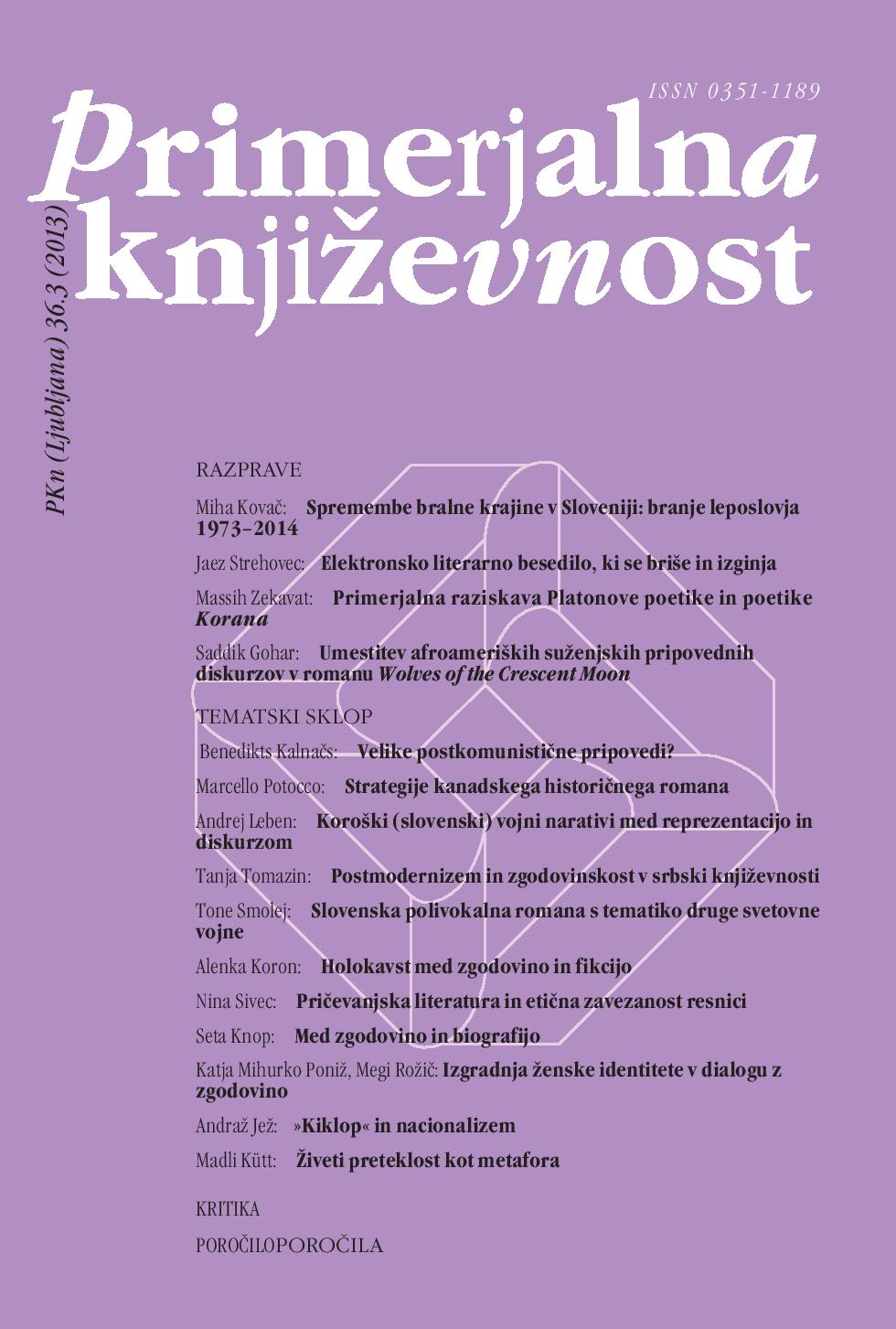Postmodernism and Historicity in Serbian Literature: The Double Engagement of Serbian Postmodernism
Keywords:
literature and history, postmodernism, historiographic metafiction, Serbian literature, novel, literary system, social-political engagementAbstract
The contribution looks at the Serbian postmodernist novel and its paradoxical historicity, which was one of the primary reasons for the exclusion of postmodernism from the Serbian literary system. Disapproval took the form of literary-historical omission and a public polemic between the postmodernists and the so-called traditionalist in 1996. Postmodern concepts of history as a reflection of the broader social (scientific and philosophical) context of the latter half of the 20th century also made their way into the Serbian region and profoundly upset the deep-rooted historical perceptions and the concomitant traditional concepts of literary creation. The invalidation of “grand narratives” (grand authorities) proved problematic particularly in cultures with a powerful epic tradition, which Serbian certainly is. The Serbian literary system saw this invalidation as detrimental especially in the 90s, which marked a crisis for the Serbian nation during which the need for an engaged literature in the service of tradition/nation was pronounced. Postmodernist literature evades such functionality through its internal (self-referential metafictional) structure, which gained considerable momentum in Serbia at the time as it undertook to separate political and literary discourse, which were closely intertwined in the Serbian literature of the 20th century. We can thus talk of a double implicit engagement of Serbian postmodernism. The contribution outlines the literary-historical development of Serbian postmodernism and Serbian historiographic metafiction. As well, it shows why and in what ways the historicity of literary narration was a subject of conflict in Serbian literature through an overview of some of the central postmodern innovations of historical concepts and their (non)integration into the social-political situation of the national literary system.References
Brajović, Tihomir. Kratka istorija preobilja. Kritički bedeker kroz savremenu srpsku poeziju i prozu. Zrenjanin: Agora, 2009.
Daković, Nenad. »Zašto ‘novi nihilizam’«. Novi nihilizam. Postmodernistička kontroverza. Ur. Milorad Belančić, Nenad Daković, Ratko Šutić. Beograd: Dom omladine Beograda, 1996. 5–7.
─ ─ ─. »Zlatno doba svakodnevnice«. Novi nihilizam. Postmodernistička kontroverza. Ur. Milorad Belančić, Nenad Daković, Ratko Šutić. Beograd: Dom omladine Beograda, 1996. 99–104.
Damjanov, Sava. Šta to beše »mlada srpska proza«? Zapisi o »mladoj srpskoj prozi« osamdesetih. Novi Sad: Književna zajednica Novog Sada, 1990.
─ ─ ─. Šta to beše srpska postmoderna? Beograd: Službeni glasnik, 2012.
Foucault, Michel. Besede in reči. Arheologija humanističnih znanosti. (Prevedla Samo Tomšič in Ana Žerjav.) Ljubljana: Studia Humanitatis, 2010.
Hutcheon, Linda. A Poetics of Postmodernism. New York in London: Routledge, 1995.
Jerkov, Aleksandar. »Nova tekstualnost«. Književnost 45.11–12 (1990): 1886–1916.
─ ─ ─. »Nove tendencije u srpskoj prozi. Prigovori postmodernom dobu«. Književnost 48.100 (1994): 1286–1294.
─ ─ ─. Antologija srpske proze postmodernog doba. Beograd: Srpska književna zadruga, 1992.
Kiš, Danilo. Čitanka. Ur. Julija Uršič. (Prevedli Drago Bajt, Miha Avanzo, Ferdinand Miklavc in Mojca Mihelič.) Maribor: Litera, 2011.
Lyotard, Jean François. Postmoderno stanje. Poročilo o vednosti. (Prevedla Simona P. Grilc.) Ljubljana: Društvo za teoretsko psihoanalizo (Zbirka Analecta), 2002.
Matajc, Vanesa. »Zgodovina in njeni literarni žanri: tematski številki revije na pot.« Zgodovina in njeni literarni žanri. History and Its Literary Genres. Ur. Vanesa Matajc in Gašper Troha. Ljubljana: Slovensko društvo za primerjalno književnost, 2007. 1–11.
McHale, Brian. Postmodernist Fiction. London in New York: Routledge, 1991.
Milutinović, Zoran. »Postnihilistička kontroverza«. Novi nihilizam. Postmodernistička kontroverza. Ur. Milorad Belančić, Nenad Daković, Ratko Šutić. Beograd: Dom omladine Beograda, 1996. 191–205.
Novak-Bajcar, Silvija. »Zašto je postmodernizam u srbiji (ipak) moguć«. Nasleđe: časopis za književnost, umetnost i kulturna pitanja 7.16 (2010): 123–131.
Novi nihilizam. Postmodernistička kontroverza. Ur. Milorad Belančić, Nenad Daković, Ratko Šutić. Beograd: Dom omladine Beograda, 1996.
Pantić, Mihajlo. Kapetan sobne plovidbe. Puzzle IV. Novi Sad: Dnevnik in Budućnost, 2003.
─ ─ ─. Slankamen. Puzzle VI. Beograd: Arhipelag, 2009.
─ ─ ─. Tortura teksta. Puzzle II. Dnevnici, eseji, poetički memoari. Podgorica: Oktoih, 2000.
Perišić, Igor. Gola priča. Beograd: Institut za književnost i umetnost, 2007.
Plahuta Simčič, Valentina. »Če je postmodernizem mrtev, sem jaz postmodernistični duh«. Delo 49.202 (2007): 8.
Tomazin, Tanja. Primerjalna literarna zgodovina slovenskega in srbskega romana med letoma 1980 in 1995: doktorska disertacija. (Mentorica: Vanesa Matajc.) Ljubljana: T. Tomazin, 2014.
─ ─ ─. »Srbski literarni postmodernizem – želja ali zgodovinsko dejstvo?« Jezik in slovstvo 58.3 (2013): 21–34.
Uršič, Julija. »Polemika o plagiatu ali kako je nastajal postmodernizem v Jugoslaviji«. Primerjalna književnost 29.2 (2006): 103–123.
Virk, Tomo. Strah pred naivnostjo. Ljubljana: Literarno umetniško društvo Literatura, 2000.
Žunić, Dragan. Nacionalizam i književnost. Srpska književnost 1985–1995. Niš: Prosveta, 2002.


